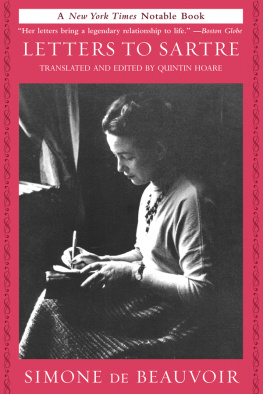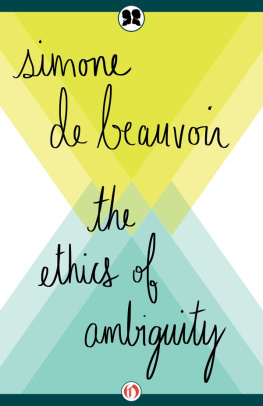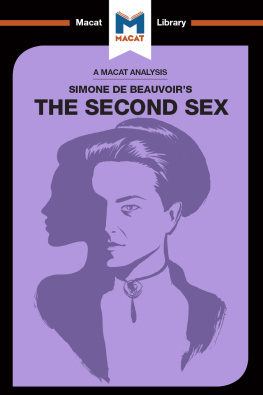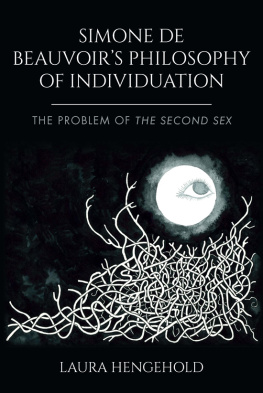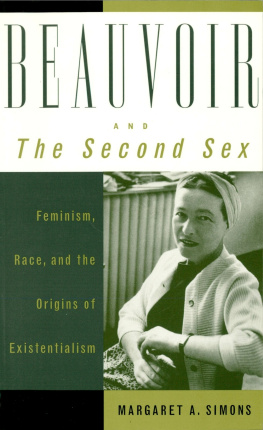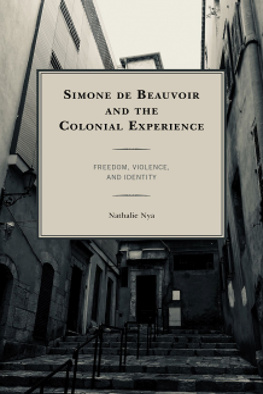Simone de Beauvoir - Must We Burn Sade?
Here you can read online Simone de Beauvoir - Must We Burn Sade? full text of the book (entire story) in english for free. Download pdf and epub, get meaning, cover and reviews about this ebook. year: 1951-52, publisher: Olympia Press, genre: Detective and thriller. Description of the work, (preface) as well as reviews are available. Best literature library LitArk.com created for fans of good reading and offers a wide selection of genres:
Romance novel
Science fiction
Adventure
Detective
Science
History
Home and family
Prose
Art
Politics
Computer
Non-fiction
Religion
Business
Children
Humor
Choose a favorite category and find really read worthwhile books. Enjoy immersion in the world of imagination, feel the emotions of the characters or learn something new for yourself, make an fascinating discovery.

- Book:Must We Burn Sade?
- Author:
- Publisher:Olympia Press
- Genre:
- Year:1951-52
- Rating:4 / 5
- Favourites:Add to favourites
- Your mark:
- 80
- 1
- 2
- 3
- 4
- 5
Must We Burn Sade?: summary, description and annotation
We offer to read an annotation, description, summary or preface (depends on what the author of the book "Must We Burn Sade?" wrote himself). If you haven't found the necessary information about the book — write in the comments, we will try to find it.
Must We Burn Sade? — read online for free the complete book (whole text) full work
Below is the text of the book, divided by pages. System saving the place of the last page read, allows you to conveniently read the book "Must We Burn Sade?" online for free, without having to search again every time where you left off. Put a bookmark, and you can go to the page where you finished reading at any time.
Font size:
Interval:
Bookmark:
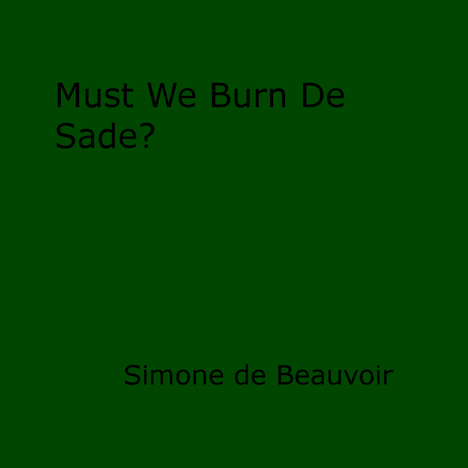
Simone de Beauvoir's essay was originally published in French as Faut-il brler Sade? in Les Temps Modernes, December, 1951 and January, 1952.
The Pense was published in Le Marquis de Sade by Maurice Heine ( Paris: Gallimard, 1950). The Letter to Madame de Sade was published in L'Aigle, Mademoiselle... , edited by Gilbert Lely ( Paris: Les Editions Georges Artigues, 1949).
Il faut toujours en revenir de Sade, c'est--dire l'homme naturel, pour expliquer le mal .
CHARLES BAUDELAIRE
Journaux Intimes
by SIMONE DE BEAUVOIR
Imperious, choleric, irascible, extreme in everything, with a dissolute imagination the like of which was never seen, atheistic to the point of fanaticism, there you have me in a nutshell, and kill me again or take me as I am, for I shall not change.
They chose to kill him, first by slow degrees in the boredom of the dungeon and then by calumny and oblivion. This latter death he had himself desired. When the grave has been filled in, it will be sown with acorns so that eventually all trace of my tomb may disappear from the surface of the earth, just as I like to think that my memory will be effaced from the minds of men.... This was the only one of his last wishes to be respected, though most carefully so. The memory of Sade has been disfigured by preposterous legends; his very name has buckled under the weight of such words as sadism and sadistic. His private journals have been lost, his manuscripts burnedthe ten volumes of Les Journes de Florbelle, at the instigation of his own son-his books banned. Though in the latter part of the nineteenth century Swinburne and a few other curious spirits became interested in his case, it was not until Apollinaire that he assumed his place in French literature. However, he is still a long way from having won it officially. One may glance through heavy, detailed works on The Ideas of the Eighteenth Century, or even on The Sensibility of the Eighteenth Century, without once coming upon his name. It is understandable that as a reaction against this scandalous silence Sade's enthusiasts have hailed him as a prophetic genius; they claim that his work heralds Nietzsche, Stirner, Freud, and surrealism. But this cult, founded, like all cults, on a misconception, by deifying the divine marquis only betrays him. The critics who make of Sade neither villain nor idol, but a man and a writer can be counted upon the fingers of one hand. Thanks to them, Sade has come back at last to earth, among us.
The aging Sade ordering baskets of roses to be brought to him, smelling them voluptuously and soiling them afterwards in the mud of the gutters with a sardonic laugh. Present-day journalists have taught us how this kind of anecdote is manufactured.
But just what is his place? Why does he merit our interest? Even his admirers will readily admit that his work is, for the most part, unreadable; philosophically, it escapes banality only to founder in incoherence. As to his vices, they are not startlingly original; Sade invented nothing in this domain, and one finds in psychiatric treatises a profusion of cases at least as interesting as his. The fact is that it is neither as author nor as sexual pervert that Sade compels our attention: it is by virtue of the relationship which he created between these two aspects of himself. Sade's aberrations begin to acquire value when, instead of enduring them as his fixed nature, he elaborates an immense system in order to justify them. Inversely, his books take hold of us as soon as we become aware that for all their repetitiousness, their platitudes and clumsiness, he is trying to communicate an experience whose distinguishing characteristic is, nevertheless, its win to remain incommunicable. Sade tried to make of his psychophysical destiny an ethical choice; and of this act, in which he assumed his separateness, he attempted to make an example and an appeal. It is thus that his adventure assumes a wide human significance. Can we, without renouncing our individuality, satisfy our aspirations to universality? Or is it only by the sacrifice of our individual differences that we can integrate ourselves into the community? This problem concerns us all. In Sade the differences are carried to the point of outrageousness, and the immensity of his literary effort shows how passionately he wished to be accepted by the human community. Thus, we find in his work the most extreme form of the conflict from which no individual can escape without self-deception. It is the paradox and, in a sense, the triumph of Sade that his persistent singularity helps us to define the human drama in its general aspect.
In order to understand Sade's development, in order to grasp the share of his freedom in this story, in order to assess his success and his failure, it would be useful to have precise knowledge of the facts of his situation. Unfortunately, despite the zeal of his biographers, Sade's life and personality remain obscure on many points. We have no authentic portrait of him, and the contemporary descriptions which have come down to us are quite poor. The testimony at the Marseille trial shows him at thirty-two, a handsome figure of a man, full faced, of medium height, dressed in a gray dress coat and deep orange silk breeches, a feather in his hat, a sword at his side, a cane in his hand. Here he is at fifty-three, according to a residence certificate dated May 7, 1793: Height: five feet two inches, hair: almost white, round face, receding hairline, blue eyes, medium nose, round chin. The description of March23, I794 is a bit different; Height: five feet two inches, medium nose, small mouth, round chin, grayish blond hair, high receding hairline, light blue eyes. He seems to have lost his handsome figure, since he writes a few years later, in the Bastille, I've taken on, for lack of exercise, such an enormous amount of fat that I can hardly move about. it is this corpulence which first struck Charles Nodier when he met Sade in 1807 at Sainte-Plagie. An immense obesity which hindered his movements so as to prevent the exercise of those remains of grace and elegance which still lingered in his general comportment. There remained, nevertheless, in his weary eyes an indefinable flash and brilliance which took fire from time to time, like a dying spark on a dead coal. These testimonies, the only ones we possess, hardly enable us to visualize a particular face. It has been said that Nodier's description recalls the aging Oscar Wilde; it suggests Montesquiou and Maurice Sachs as well, and it tempts us to imagine a bit of Charlus in Sade, but the data is very weak.
Even more regrettable is the fact that we have so little information about his childhood. If we take the account of Valcour for an autobiographical sketch, Sade came to know resentment and violence at an early age. Brought up with Louis-Joseph de Bourbon, his contemporary, he seems to have defended himself against the selfish arrogance of the young prince with such displays of anger and brutality that he had to be taken away from court. Probably his stay in the gloomy chateau of Saumane and in the decaying abbey of Ebreuil left its mark upon his imagination, but we know nothing significant about his brief years of study, his entry into the army, or his life as an amiable man of fashion and debauchee. One might try to deduce his life from his work; this has been done by Klossowski, who sees in Sade's implacable hatred of his mother the key to his life and work. But he derives this hypothesis from the mother's role in Sade's writings. That is, he restricts himself to a description of Sade's imaginary world from a certain angle. He does not reveal its roots in the real world. In fact, we suspect a priori, and in accordance with certain general notions, the importance of Sade's relationship with his father and mother; the particular details are not available to us. When we meet Sade he is already mature, and we do not know how he has become what he is. Ignorance forbids us to account for his tendencies and spontaneous behavior. His emotional nature and the peculiar character of his sexuality are for us data which we can merely note. Because of this unfortunate gap, the truth about Sade will always remain closed to us; any explanation would leave a residue which only the child. hood history of Sade might have clarified.
Font size:
Interval:
Bookmark:
Similar books «Must We Burn Sade?»
Look at similar books to Must We Burn Sade?. We have selected literature similar in name and meaning in the hope of providing readers with more options to find new, interesting, not yet read works.
Discussion, reviews of the book Must We Burn Sade? and just readers' own opinions. Leave your comments, write what you think about the work, its meaning or the main characters. Specify what exactly you liked and what you didn't like, and why you think so.


